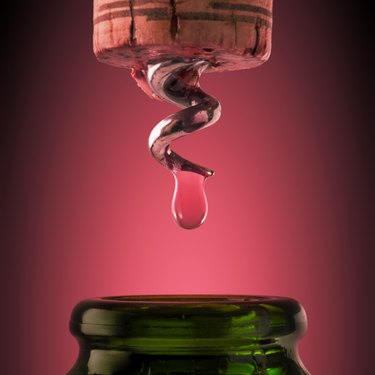
Whether you only felt like a single glass or the party wound down with a few half-empty bottles lying around, you don't need to pour out the rest of your wine. Stored properly, a half-full bottle of wine should still be good for a few days. The exact length of time varies depending on the wine, but you can do some things to extend it.
Wine Life Expectancy
Video of the Day
Exactly how long your wine will last depends on the wine itself. Most red and white wines will last for about two to three days after opening; after this point, they begin to sour and lose their flavor. Sparkling wines lose their carbonation almost immediately and should be enjoyed as soon as they are opened. By contrast, fortified wines such as port or sherry can last several weeks or more; the higher the alcohol content, the longer the life of the wine.
Video of the Day
Wine lifespan varies depending on the acidity of the wine; a high-acidity wine such as a Riesling or Sauvignon Blanc will survive a little longer than a lower-acidity wine such as a Pinot Grigio.
How to Spot Bad Wine
As wine is exposed to air, it begins to undergo a chemical reaction called oxidation. Whites are more vulnerable to oxidation than reds, but both will oxidize rapidly if left exposed to oxygen. The color of the wine may change; if a Merlot takes on a brick-red hue or a Pinot Grigio begins to go brown, it's oxidized. Oxidized wines typically develop a dry, bitter flavor, although the exact result varies depending on the wine.
Prolonging Your Wine's Life
Once you've uncorked your bottle, the clock is ticking. However, you can do a few things to maximize the wine's lifespan. With proper care, you can make a bottle of wine last a week or even more. Cork the bottle tightly, using the original cork or a wine stopper. Refrigerate it, even if it's red; this will inhibit oxidation. You can also transfer the remaining contents into a smaller bottle to reduce the surface area exposed to oxygen. For the gadget lover, devices are available to remove air from the bottle or even replace the air it contains with an inert gas; these might be good strategies for an expensive bottle, but for ordinary table wine they're probably overkill.
What to Do With Spoiled Wine
Once wine has started to lose its character, you don't have to get rid of it right away. Wine that you wouldn't drink can still be useful in the kitchen. If you have a recipe that calls for wine, feel free to use older wine for it; the differences in flavor won't be noticeable in a dish with lots of other ingredients.
You can also put old wine to other uses; some believe that a small amount of wine added to your bath helps to soften the skin. You can also use red wine as a fabric dye.
- Huffington Post: A Guide to Opened Wine
- Jancis Robinson: Pinot Grigio
- Sommelier Journal: Wine Flaws - Oxidation
- Wine Folly: 7 Wine Faults and How to Sniff Them Out
- Toronto Sun: How Long Will an Open Bottle of Wine Keep?
- Wine Folly: Drink All Week -- Tips on Storing Open Wine
- The Guardian: 23 Recipes for Leftover Wine
- EcoSalon: 20 Unusual Uses for Wine